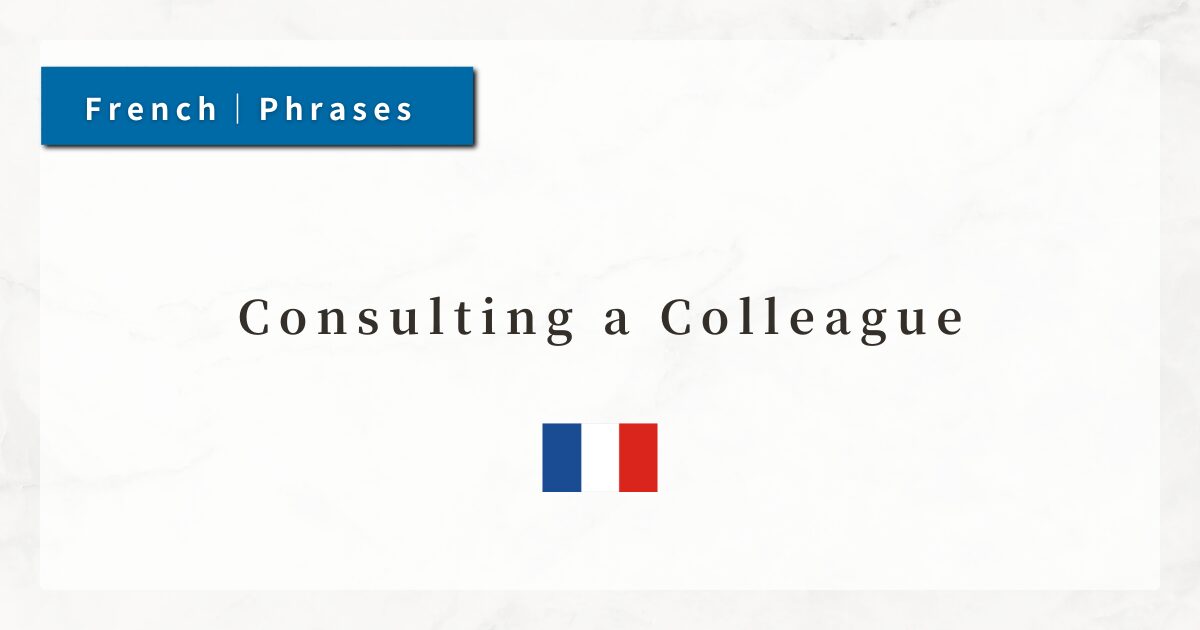#50 Consulting a Colleague|French Conversation Phrases

At work, there are many occasions when you need to consult a colleague about how to proceed with a task or to share ideas.
Being able to say naturally in French expressions like “May I ask your advice?” or “What do you think?” makes communication much smoother.
In this lesson, I will introduce useful phrases for consulting a colleague and explain the key grammar points.
Dialogue

Salut, tu as un moment ? J’aimerais te parler d’un projet.
(Hi, do you have a moment? I’d like to talk to you about a project.)

Oui, bien sûr. De quoi s’agit-il ?
(Yes, of course. What is it about?)

J’ai des difficultés avec la présentation. Tu peux me donner ton avis ?
(I’m having some difficulties with the presentation. Could you give me your opinion?)

Pas de problème. Montre-moi ce que tu as préparé.
(No problem. Show me what you’ve prepared.)
1. Asking “Do you have a moment?”
A useful way to start a consultation is:
- Tu as un moment ?
(Do you have a moment?)
This is casual and natural when speaking to a colleague you know well.
- Est-ce que vous avez un moment ?
(May I have a moment of your time?)
In French, tu is used with close colleagues and friends, while vous is used in formal situations or when speaking to superiors.
Switching between tu and vous depending on the context is very important.
2. Introducing the Consultation
When starting a consultation, it is natural to first state the subject you want to discuss.
- J’aimerais te parler d’un projet.
(I’d like to talk to you about a project.)
“J’aimerais …” means “I would like to …” and is a polite, considerate way to make a request.
- J’ai besoin de ton aide.
(I need your help.)
The structure “avoir besoin de …” (“to need …”) is widely applicable in daily situations.
3. Asking for Opinions
The essence of consultation is to ask for someone’s opinion. Common expressions include:
- Tu peux me donner ton avis ?
(Could you give me your opinion?) - Qu’est-ce que tu en penses ?
(What do you think?)
Here, avis means “opinion.” The phrase donner son avis means “to give one’s opinion.”
- Pourriez-vous me donner votre avis ?
(Could you give me your opinion, please?)
Using pourriez-vous (conditional of pouvoir) softens the tone and makes the request more formal.
4. Common Responses from Colleagues
When a colleague agrees to help, the following expressions are commonly used:
- Bien sûr.
(Of course.) - Pas de problème.
(No problem.) - Montre-moi ce que tu as préparé.
(Show me what you’ve prepared.)
The phrase “Montre-moi …” is a very handy expression for asking someone to show you something.
Summary
- Tu as un moment ? / Est-ce que vous avez un moment ?
→ Asking if someone has time - J’aimerais te parler de …
→ Introducing a topic politely - J’ai besoin de ton aide.
→ Asking for help - Tu peux me donner ton avis ? / Qu’est-ce que tu en penses ?
→ Asking for opinions




